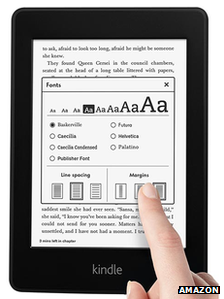Kindle Fire HD and Paperwhite sales make Amazon no profit
- Published
Amazon boss Jeff Bezos discusses the Kindle Fire HD
Amazon has confirmed it will not make a profit from sales of its latest Kindle tablet and e-reader devices.
"We sell the hardware at our cost, so it is break-even on the hardware," chief executive Jeff Bezos told the BBC.
It is a stark contrast to the strategy of best-selling tablet-maker Apple.
Mr Bezos made the comments as his firm launched its new Paperwhite e-reader and an associated book lending scheme in the UK, Germany and France.
The latest e-ink powered device features a built-in light that will help the firm compete against Barnes & Noble's Nook Glowlight and Kobo's Glo, which offer a similar feature.
Amazon is seeking to distinguish its line-up by offering a subscription package that includes access to the Kindle Owners' Lending Library.
The service offers users the ability to borrow up to one book a month from a selection of titles including well known authors - such as JK Rowling - and writers who have published their works through Amazon's own publishing system.

The Kindle Paperwhite has a 6in (15cm) screen and a built-in light
The UK service will include more than 200,000 ebooks at launch.
While other e-readers lack a matching facility, if they support the ePub format their owners can still borrow ebooks from their local library if it supports the OverDrive system.
Bigger appetites
Deliveries of Amazon's Kindle Paperwhite will begin in Europe on 25 October, coinciding with the release of its 7in (18cm) Kindle Fire HD tablets.
Mr Bezos made clear that the devices' success would depend on how many books and other media files were subsequently bought by their owners.
"We want to make money when people use our devices, not when people buy our devices," he told the BBC.
By contrast Apple has indicated in the past that it makes much of its profits from device sales while running its iTunes store "slightly above" break-even.
Android tablet makers also rely on hardware sales. While Google provides their system software for free, the search giant keeps a cut of app and digital media sales made via its Google Play marketplace.
Mr Bezos said that part of the reason his strategy worked was that users' appetite for media appeared to grow once they owned one of his devices.
"What we find is that when people buy a Kindle they read four times as much as they did before they bought the Kindle.
"But they don't stop buying paper books. Kindle owners read four times as much, but they continue to buy both types of books."
Prime subscription
Amazon is also attempting to use its hardware to stimulate sales of other physical products sold via its store.
Access to its Lending Library facility will be tied to a £49 annual subscription to its Amazon Prime service.
The offer includes rapid delivery, at no additional cost, of products from its warehouses.
Although this adds to the firm's shipping costs, evidence from the US suggests that subscribers end up spending more on its site and are less likely to compare prices with rival retailers.
"Prime does lock you into its platform," said Colin Gillis, a New York-based technology analyst at BGC Partners.
"Prime has been the core way for Amazon to reduce the influence small differences in prices can have, to keep its customers loyal.
A closer look at Amazon's Kindle Fire HD
"Amazon's push into offering free digital media content is designed to correlate with its wider sales activity.
"But the activities cost money and investors are worried that the firm does not disclose details about how its Prime numbers break down."
A spokeswoman for Amazon said she could not discuss the terms of the licences signed with third-party publishers to allow it to lend out their ebooks.
She added that a monthly fund would be shared out among members of its own Kindle Direct Publishing network based on how many times their titles had been borrowed. She said authors could choose not to take part.
- Published11 October 2012
- Published26 September 2012
- Published6 September 2012
- Published6 September 2012